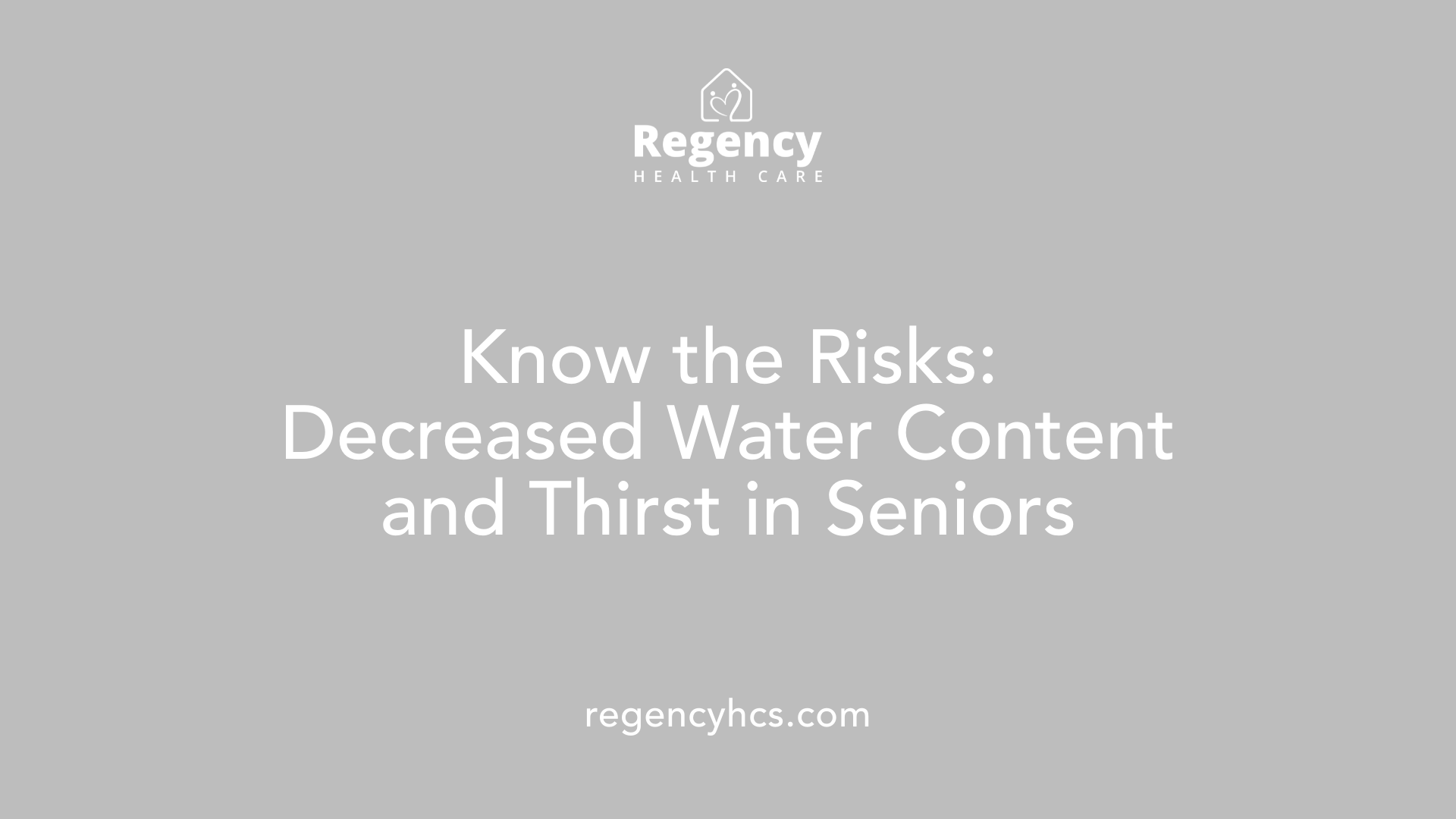Understanding Why Adequate Water Intake Is Vital for Seniors
As individuals age, their bodies undergo numerous physiological changes that increase vulnerability to dehydration. Recognizing the importance of proper hydration is essential for maintaining health, preventing complications, and enhancing quality of life among older adults. This article explores the critical role hydration plays in senior health, the risks associated with dehydration, and practical strategies for ensuring adequate fluid intake in this population.
The Physiological Impact of Aging on Hydration Needs
Why is hydration important for seniors?
Hydration becomes especially critical for older adults due to natural changes in the body that affect fluid balance. As people age, their body water content declines, and their sense of thirst diminishes. This makes it harder for seniors to recognize when they need fluids, increasing the risk of dehydration.
Proper hydration supports many vital functions. It helps maintain cardiovascular health by ensuring blood maintains the right volume and electrolyte balance. Water aids in regulating body temperature through sweat production, which is essential during hot weather or physical activity.
Digestive health also depends on adequate hydration. Water facilitates the breakdown and absorption of nutrients and prevents issues like constipation, which is common among seniors.
Lubricating joints with water reduces friction and joint pain, promoting mobility. Additionally, staying well-hydrated supports brain health, influencing mood, memory, concentration, and overall cognitive function.
Dehydration in seniors can lead to serious health consequences such as urinary tract infections, kidney stones, or even kidney failure. It also increases the risk of falls due to dizziness, muscle weakness, and confusion.
Many older adults face challenges like medications that increase fluid loss (such as diuretics), limited mobility, or cognitive impairments that hinder regular water intake. These factors make proactive hydration habits essential.
Strategies to promote hydration include drinking water regularly, eating water-rich foods like fruits and vegetables, and establishing routines or reminders for fluid intake. Careful attention to hydration can significantly improve health outcomes, reduce hospital visits, and support independence.
Ensuring that seniors stay properly hydrated is a simple yet effective way to enhance overall health, prevent complications, and improve quality of life at any age.
Recognizing and Addressing Signs of Dehydration in the Elderly

What are the signs and symptoms of dehydration in older adults?
Dehydration in seniors often presents with a variety of visible and subtle symptoms. Common physical signs include dry mouth, dry and sticky mucous membranes, dry skin that takes longer to return to normal after pinching (skin turgor test), and decreased urination—resulting in dark urine. Older adults may also experience dizziness, fatigue, weakness, muscle cramps, and headaches. As dehydration progresses, more severe symptoms can develop.
Cognitive changes such as confusion, irritability, and decreased alertness are typical, sometimes mimicking signs of dementia. Other indicators include rapid heartbeat (tachycardia) and low blood pressure. In advanced dehydration, signs like sunken eyes, inability to produce tears, and a very dry tongue may be noticeable.
It is crucial to recognize these symptoms early. For instance, the skin turgor test—pinching the skin on the back of the hand—can serve as a quick, effective indicator; slow skin recoil suggests dehydration. Recognizing these signs allows for prompt fluid repletion, preventing escalation to life-threatening states. Because older adults often do not feel thirsty or may not recognize their symptoms, caregiver vigilance and routine hydration checks are essential to safeguard health.
Impact of diminished thirst sensation and cognitive decline on symptom recognition
Age-related changes include a decreased sense of thirst, which makes it harder for seniors to realize they need to hydrate. Cognitive decline, whether due to aging or underlying health issues, further impairs their ability to communicate thirst or recognize dehydration symptoms.
This combination often results in delayed intervention, increasing the risk of complications like urinary tract infections, kidney issues, and falls. Therefore, caregivers and healthcare providers should proactively monitor hydration status, use visual cues, and implement routine drinking schedules to ensure adequate fluid intake.
Progression to severe dehydration symptoms
If dehydration is left unaddressed, symptoms can become severe. Dehydrated seniors may develop dangerously low blood pressure, which can cause dizziness and increase fall risk. Sunken eyes, severe weakness, and an absence of tears are signs of advanced dehydration.
In critical cases, individuals may lose consciousness or slip into a coma. Immediate medical attention is required to administer IV fluids and treat underlying causes. Recognizing early warning signs and initiating remedial measures is vital to prevent such outcomes.
How Aging Alters Hydration Requirements and Risks

How does aging affect hydration needs?
As people age, their hydration requirements change due to several physiological shifts in the body. The water content within tissues decreases, with water making up about 60% of adult body weight in youth, but this percentage declines with age. This reduction means older adults have less water reserve, making them more susceptible to dehydration even with minor fluid loss.
Furthermore, aging is associated with a decline in kidney function. The kidneys become less efficient at concentrating urine, which leads to increased water loss. This impaired renal ability means that older adults can't conserve water as well as younger individuals, heightening dehydration risks.
Additional age-related changes include a blunted thirst mechanism and hormonal regulation. The secretion of antidiuretic hormone (AVP) and the sensation of thirst both become less responsive. As a result, seniors often do not feel the urge to drink water, even when their bodies need hydration.
Chronic illnesses like heart disease and diabetes, common in older age, further complicate hydration status. These health conditions can cause increased fluid loss or affect the body's ability to regulate water effectively.
Research indicates that higher serum sodium levels—an indicator of dehydration—are linked to faster biological aging and increased risks of developing chronic conditions such as heart failure, stroke, and dementia. Maintaining adequate hydration in seniors is vital because it can slow down aging processes, reduce the likelihood of chronic diseases, and promote overall health.
In practice, older adults should be mindful of their fluid intake. Ensuring proper hydration through water, hydrating foods, and routine habits can significantly improve vitality, cognitive function, and longevity. Recognizing the physiological changes that occur with age allows better management of hydration to prevent dehydration and related health complications.
Practical Strategies for Ensuring Adequate Hydration
 Maintaining proper hydration is crucial for older adults' health and wellbeing. Several practical strategies can help seniors stay adequately hydrated throughout the day.
Maintaining proper hydration is crucial for older adults' health and wellbeing. Several practical strategies can help seniors stay adequately hydrated throughout the day.
One effective approach is establishing regular drinking routines. Encouraging seniors to sip fluids consistently across the day, such as after waking, with meals, and before bedtime, helps prevent dehydration. Carrying a refillable water bottle or setting reminders can serve as helpful cues to prompt regular intake.
In addition, incorporating water-rich foods into the diet can significantly boost hydration levels. Fruits like watermelon, strawberries, and cantaloupe, and vegetables such as cucumbers, lettuce, and celery, contain high water content and are easy to consume. These foods not only hydrate but also provide essential nutrients.
Enhancing the appeal of drinking water can encourage more intake. Flavoring water with natural ingredients like lemon slices, berries, or cucumber can make it taste more inviting. Using straws or infusing water with herbs can also increase interest.
Ensuring water sources are accessible is vital. Placing water pitchers or bottles near seniors' usual sitting areas, or in places they often visit, removes barriers to drinking. Caregivers should also monitor signs of dehydration—such as dry mouth, dizziness, dark urine, or confusion—and provide assistance as needed.
It's especially important for seniors to hydrate more during hot weather, after physical activity, or when unwell, as these conditions increase fluid loss. Consulting healthcare providers for personalized advice is recommended, particularly if medications like diuretics are involved.
By combining these strategies—consistent routines, appealing flavors, high-water-content foods, accessible water sources, and vigilance for dehydration signs—older adults can better maintain hydration, supporting their overall health and quality of life.
The Benefits of Proper Hydration on Cognitive and Physical Health
How does proper hydration affect cognitive and physical health in seniors?
Maintaining adequate hydration is crucial for the overall well-being of older adults. Proper fluid intake supports essential cognitive functions such as memory, focus, attention, and mental clarity. When seniors are well-hydrated, their brains receive the necessary fluids to operate efficiently, improving concentration and mood.
Conversely, dehydration can lead to confusion, irritability, and increased risk of falls due to impaired coordination. Even mild dehydration, which involves a 2% fluid loss, can significantly impact brain performance, causing issues like forgetfulness and slower reaction times.
Physically, hydration helps preserve muscle strength, joint flexibility, and the body’s ability to regulate temperature effectively. Adequate water intake reduces the likelihood of heat-related illnesses such as heat stroke and supports kidney function by aiding waste removal.
Older adults are particularly vulnerable to dehydration because of diminished thirst sensation, changes in body composition with less water stored in tissues, medication side effects like diuretics, and declining kidney function. These factors make it more challenging to maintain proper hydration levels.
Promoting hydration in seniors involves offering water-rich foods like fruits and vegetables, establishing regular water-drinking routines, and closely monitoring for signs of dehydration such as dry mouth, dark urine, or confusion. Overall, consistent hydration plays a vital role in maintaining cognitive sharpness and physical resilience in the aging population.
Ensuring Fluid Intake for a Vibrant Aging Experience
Maintaining proper hydration is a fundamental aspect of aging healthily. By understanding the physiological changes that increase dehydration risk and recognizing early symptoms, caregivers and seniors can implement effective strategies to stay well-hydrated. Incorporating water-rich foods, establishing routine habits, and monitoring hydration status are proactive steps toward preventing dehydration-related health issues, fostering independence, and improving overall quality of life. Ultimately, hydration supports the body’s vital systems, from brain function to mobility, enabling seniors to enjoy a vibrant and healthy life well into their later years.
References
- Hydration Status in Older Adults: Current Knowledge and ...
- 10 Reasons Why Hydration is Important
- Hydration and older adults: Why water matters more as you ...
- Importance of Hydration for Seniors
- Good hydration linked to healthy aging - Nhlbi.nih.gov
- How to Stay Hydrated: A Guide for Older Adults
- Proper Hydration is a Key Factor in Maintaining Senior ...
- The Importance of Hydration in North Dallas, TX
- The Importance of Staying Hydrated for Seniors
- Quenching the Thirst of Wellness: The Role of Hydration in ...

How to Support Family Caregivers Through Home Care Services
August 6, 2025
Empowering Caregivers to Enhance At-Home Support

How Home Health Aides Provide Support During Hospice Care
August 6, 2025
Supporting Comfort and Compassion in End-of-Life Care

How the NHTD Program Supports Independent Living for Individuals with Disabilities
August 6, 2025
Empowering Independence in Community Living

How to Incorporate Family Involvement in Home Care Services
August 6, 2025
Enhancing Compassionate Home Care through Family Engagement

The Impact of Loneliness on Senior Health and How Home Health Can Help
August 6, 2025
Fostering Connection: Combating Elder Loneliness for Better Health

The Importance of Caregiver Training in Patient Care Management
August 6, 2025
Enhancing Outcomes through Effective Caregiver Education and Support




